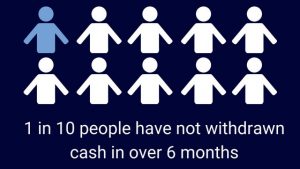The Royal Mint has cut the number of coins it puts into circulation by nearly half since 2014. Last year the government-owned mint issued 1.3 billion coins, down from the 2.3 billion of four years ago. Along with bank closures across the country, news of the Royal Mint cutting back on the volume of coins it produces has made many people consider whether the future of the UK is cashless.
How often do you withdraw cash?
Currently, in the UK, the primary ways in which Brits can take out cash is via their local bank branch or via an ATM. To help gain an understanding of how often UK citizens are handling their cash, research conducted by Wellesley analysed the money withdrawal habits of 2,025 UK citizens. With financial experts predicting that a cashless society is on the cards, could trends be found in bank and ATM visits amongst the public?
Data revealed that 1 in 10 people have not withdrawn cash from a bank or an ATM in over 6 months. With contactless payments now the norm and the transaction limit having risen from £20 to £30 in September 2015, it could be argued that many are relying on this method for much of their smaller spending and eliminating the need to physically take out cash.

Payments of the past
Since 14th February 2006 all card payments in the UK have been solely completed by chip and pin, up until the emergence of contactless nine years later. Before this, payments had to be completed in cash, by cheque, or via magnetic stripe card and sign. For many, withdrawing cash was the easiest way to keep track of finances and it simply felt more reliable.
The survey revealed that 19% of those aged 65 and over had withdrawn cash in the past three days. A further 25% stated they had done so in the past week. In general, findings revealed that those aged 55 and over withdraw cash much more frequently than younger generation. It could be said that for those who had grown up in the cash-based society of the 1970s and 1980s are still dependant and reliant upon physical money.
Card based payments overtake cash
Wellesley’s research suggests that a reliance on ATMs and banks to withdraw cash is depleting, 17% of those aged under 45 had not withdrawn cash in over 6 months. UK Finance recently revealed that card-based payments outstripped cash for the first time in 2017, this supports the notion that cash payments are becoming redundant as Brits opt for card spending.
Around 2 in 3 Brits use contactless daily and, overseas, some countries have scrapped a transaction limit altogether. If the UK were to follow this trend, would it be the final nail in the coffin for bank branches and ATMS? With cards only primarily used today to withdraw cash, this change could evoke a completely cashless society.
Does the future of the UK look Swedish?
Sweden is the first country in the world to adopt a predominantly cashless society. 80% of all transactions in Sweden are made digitally, whether via a card or app.
But, why has Sweden taken this path, and is the UK likely to follow? In short, Swedish people trust their banking system and find cashless payments much more convenient.
Former No 10 aide Daniel Korski suggested a target of eliminating hard currency in the UK by 2020, seemingly following in Sweden’s footsteps. Whilst this might seem too short a time frame now for complete exclusion, the UK has already become one of the world’s most cashless societies. Cash currently accounts for only 3.9% of all payments by value.
One huge benefit of a cashless society highlighted by the government is that a decline in crime rates could be expected. Tax evasion, theft, corruption, the drugs trade, human trafficking and the black market have cash at their core and removing the payment method could see a reduction in these crimes.
The UK has a culture of increasing convenience which has transformed the way we pay for items and will continue to do so into the future. Contactless and app payments are now the norm and those who are not as digitally competent may struggle as it is predicted that the UK will continue on its journey to a completely cashless society. Some financial experts even predict that 2020 is a feasible goal.
